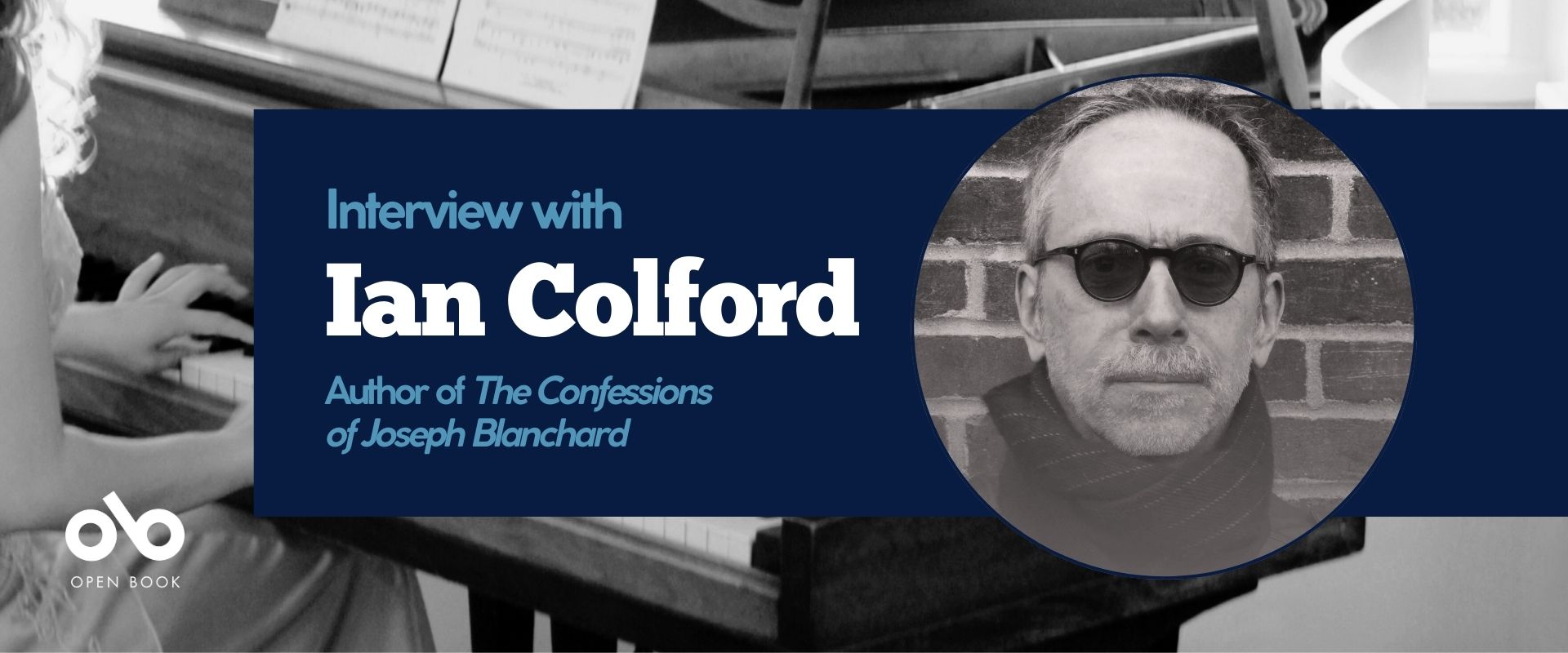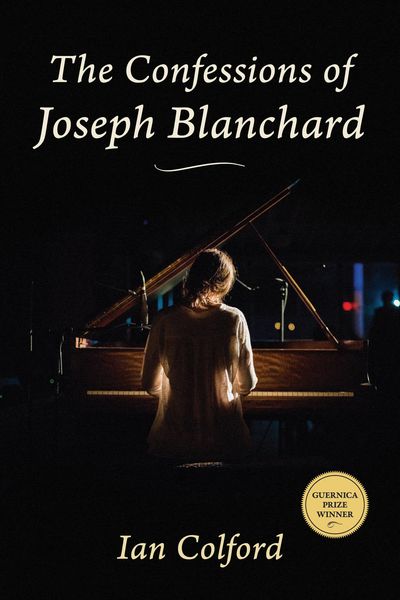Ian Colford on Writing His Third Novel, a Dark Tale of Power and Obsession
Ian Colford's The Confessions of Joseph Blanchard (Guernica Editions) is a novel that looks squarely at our most firmly-held collective taboos. Set in Halifax, the titular Joseph Blanchard is ill and elderly. He calls his closest confidante to him, having reached a confessional point in his life. But his confession is nothing like what anyone could have expected.
Jumping back in time to Joseph in his late 30s, we see a story of obsession play out as he becomes fixated on his 19-year old first cousin, Sophie, a talented concert pianist. Her teenage crush on Joseph allows him opportunity to convince her to embark on a secret affair. But as her talents take her to loftier and loftier heights, Joseph's jealousy of her time spent with fellow musicians—many of them boys and men close to her in age—and her growing independence begins to grow into a living monster. When his rage boils over in an irreversible incident, Joseph panics and covers the evidence, keeping his secret for decades.
Tense, dark, and nuanced, weaving the music that shapes Sophie's life into the narrative in fascinating ways, The Confessions of Joseph Blanchard is the third novel from Colford, who is the author of the decorated novels Evidence and The Crimes of Hector Tomás, as well as short fiction and a novella.
We're speaking with him today for our Long Story series, and he tells us about his journey to write the novel, which started back in 1994 and included "two decades of revisions", why it was important to him that the book have "a distinctive Nova Scotia flavour", and the important lesson he learned from writing The Confessions of Joseph Blanchard.
Open Book:
Do you remember how you first started this novel or the very first bit of writing you did for it?
Ian Colford:
I remember beginning the writing process when I was on sabbatical from my job as a librarian at Dalhousie University. This was in 1994. I had a library-sanctioned sabbatical project to work on, but I also had an idea for a novel and thought I could work on that too. I had talked my way into a vacant office in the Dal English Department on the pretence that, in addition to doing my own work, I could meet with students to talk about their creative writing projects. The office was quiet. It was January and very cold and I remember sitting at the desk on the morning of the first day after the Christmas holidays and starting in on the novel, writing the first sentence (actually a question) of chapter one and going on from there. That first sentence appears in the novel exactly how I wrote it that day.
OB:
How did you choose the setting of your novel? What connection, if any, did you have to the setting when you began writing?
IC:
Initially I didn’t give much thought to setting. I’d lived in Halifax my entire life, so the streets and buildings and other Halifax landmarks that appear in the novel happened naturally, almost by default. But as I got further into the story, the setting became more of a conscious choice, and I started looking for ways to incorporate elements of the city and the province into my characters’ lives. Pauline is involved with the Nova Scotia Historical Society and the Halifax Public Gardens. Frederick is a member of the Nova Scotia College of Physicians and Surgeons. There are numerous mentions of Dalhousie University, and one pivotal scene takes place in the Dal Arts Centre. When I sent Sophie and Joseph out of the city together, it was to a tourist spot that closely resembles Nova Scotia’s Annapolis Valley. The prominence of the city of Halifax is an influential element of the story and I like to think that the novel has a distinctive Nova Scotia flavour. I’m certain the novel would be different if I had set it elsewhere.
OB:
Did you do any specific research for this novel? Tell us a bit about that process.
IC:
Music plays a huge role in the novel. I love music and I’m always listening to one or another type of music—rock, pop, jazz. When I’m writing I usually have some sort of classical music playing in the background. I’ve read a bit of music history and theory. But I’m not a musician. As someone who appreciates music as a spectator, the challenge was to write convincingly about Sophie’s performances, to express Joseph’s astonishment upon witnessing eight-year-old Sophie playing Mozart to perfection, to listen to Ravel’s Gaspard de la Nuit as Sophie would, and then translate the sensations into words. I listened repeatedly to all the works mentioned in the book, recording my impressions as I went. Those passages are some of the most heavily revised because it took so long for me to be satisfied with them.
Your CanLit News
Subscribe to Open Book’s newsletter to get local book events, literary content, writing tips, and more in your inbox
OB:
What was the strangest or most memorable moment or experience during the writing process for you?
IC:
It wasn’t so much the writing process that was strange or memorable. If anything, the writing was straightforward: I had a story to tell, and I told it to the best of my abilities. What really stands out is the long and winding road to publication. I completed the initial draft in 1998 and started submitting it almost immediately. The rejections came swiftly and were remarkable diverse. Most were the dismissive form letters that all writers are familiar with. But I also received personalized letters complimenting the writing and saying how much people had enjoyed reading it. A few hinted that the manuscript had received serious attention. Some offered editorial advice and recommendations for improvement. I was prepared for rejection—I was used to it and expected it. What was confusing was seeing the novel praised—sometimes lavishly—at the same time as it was being rejected.
In a way though, the lengthy delay before publication somehow became an integral part of the writing process, because the writing continued, on and off, over the intervening 20-odd years. Lots of people read the manuscript and offered helpful comments. For a while I had an agent, and she suggested changes. A few years later, after I had parted ways with my agent—while the pandemic was keeping everyone home—I was reviewing my unpublished manuscripts and decided to make more changes to this one. Two decades of revisions have been incorporated into the finished novel that people are reading today.
OB:
What, if anything, did you learn from writing this novel?
IC:
Any writing job is a learning process. You learn something from writing a 400-word book review. You learn something different from writing a novel. Writing this novel taught me that having faith in your work is key to surviving as a writer. At any point in the 25 years between completing the first draft and seeing it become a printed book, I could have trashed it—written it off as a lost cause. It would have been easy because all the while I was working on other projects, stories and novels that turned out to be much easier to get published. Joseph’s Confessions sat untouched for years at a time. But I always came back to it. I’d read parts of it over and think, Yeah this deserves to be published. I’d send it out and a few more rejections would roll in. But I resisted giving up because people had read it and said they enjoyed it. I was convinced the writing was good, that the book had value, and that it would eventually find its audience. Turns out I was right.
_____________________________________________
Ian Colford was born, raised and educated in Halifax. His reviews and stories have appeared in many print and online publications. He is the author of two collections of short fiction and two novels and is the recipient of the Margaret and John Savage First Book Award for Evidence.






